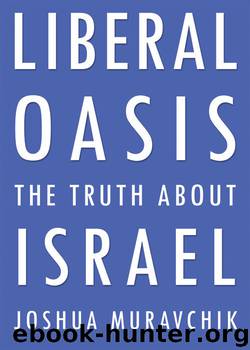Liberal Oasis by Joshua Muravchik

Author:Joshua Muravchik [Muravchik, Joshua]
Language: eng
Format: epub
ISBN: 978-1-59403-755-9
Publisher: Encounter Books
Here and there, where Jews did not flee in 1948, such as a remnant of the Jewish community of Egypt, they fled a few years later when revolutionary regimes seized power, rendering their against-the-odds endurance utterly hopeless. The only exceptions are Morocco, where the patronage of the monarch has permitted a few thousand Jews to live to this day in a country where once they numbered a quarter-million, and Tunisia where about one-thousand live on the island of Djerba and a few hundred on the mainland. Elsewhere the situation has been pitiless. In the early 1980s, soon after its founding, Hizbullah kidnapped and murdered seven of the dozen or so elderly Jews who remained in Lebanon. In Iraqi election campaigns in recent years, flyers have been distributed in which candidates accuse each other of wanting to bring the Jews back to Iraq where they once were so numerous that they constituted the largest of Baghdad’s multiple ethic groups.
This, of course, is absurd. But why? Why do no Jews demand the “right of return” to their pre-1948 homes just as the Palestinian Arabs do? For the simple and sufficient reason that they would be slaughtered. This, too, is a standard of comparison against which to measure the status of Arabs in Israel.
The contrasting treatment of Arabs in Israel and Jews in the Arab lands is only one reflection of the gulf between Israel and its neighbors in the treatment of minorities, especially religious sects. For example, consider the Bahai whose faith, followed by an estimated seven million,54 was founded in the mid-19th century by Baha’ullah, born Husayn Ali, an Iranian who loved nature, succored the poor, and preached: “that all nations should become one in faith and all men as brothers … that diversity of religion should cease, and differences of race be annulled.”55
Imprisoned and tortured by his native land and the Ottoman sultans, Baha’ullah was banished to the fortified town of Akko, and passed his last decades between Akko and Haifa in what is now Israel. For that reason, the two holiest sites to Bahais are in Israel. But not for that reason alone: they are there also because Israel has welcomed the Bahai and made it possible for the faith to establish its administrative center, like a mini-Vatican, in Haifa and to convene meetings there of its leaders from across the world.
In contrast, the adherents of this religion have been treated harshly in Iran where it was born. Bahais have always faced persecution in Iran, but as the Bahai world movement reports:
In 1979, with the establishment of the Islamic Republic of Iran, the persecutions took a new direction, becoming an official government policy and being pursued in a systematic way. Since then, more than 200 Bahá’ís have been executed or killed, hundreds more have been imprisoned, and tens of thousands have been deprived of jobs, pensions, businesses, and educational opportunities. Formal Bahá’í administration had to be suspended, and holy places, shrines, and cemeteries have been confiscated, vandalized, or destroyed.56
Download
This site does not store any files on its server. We only index and link to content provided by other sites. Please contact the content providers to delete copyright contents if any and email us, we'll remove relevant links or contents immediately.
| Africa | Americas |
| Arctic & Antarctica | Asia |
| Australia & Oceania | Europe |
| Middle East | Russia |
| United States | World |
| Ancient Civilizations | Military |
| Historical Study & Educational Resources |
Empire of the Sikhs by Patwant Singh(23086)
The Wind in My Hair by Masih Alinejad(5095)
Rise and Kill First by Ronen Bergman(4789)
The Templars by Dan Jones(4689)
The Rape of Nanking by Iris Chang(4213)
12 Strong by Doug Stanton(3550)
Blood and Sand by Alex Von Tunzelmann(3205)
Babylon's Ark by Lawrence Anthony(2679)
The History of Jihad: From Muhammad to ISIS by Spencer Robert(2628)
No Room for Small Dreams by Shimon Peres(2368)
Inside the Middle East by Avi Melamed(2357)
The Turkish Psychedelic Explosion by Daniel Spicer(2357)
Gideon's Spies: The Secret History of the Mossad by Gordon Thomas(2353)
Arabs by Eugene Rogan(2299)
The First Muslim The Story of Muhammad by Lesley Hazleton(2271)
Come, Tell Me How You Live by Mallowan Agatha Christie(2260)
Bus on Jaffa Road by Mike Kelly(2159)
1453 by Roger Crowley(2031)
Kabul 1841-42: Battle Story by Edmund Yorke(2029)
